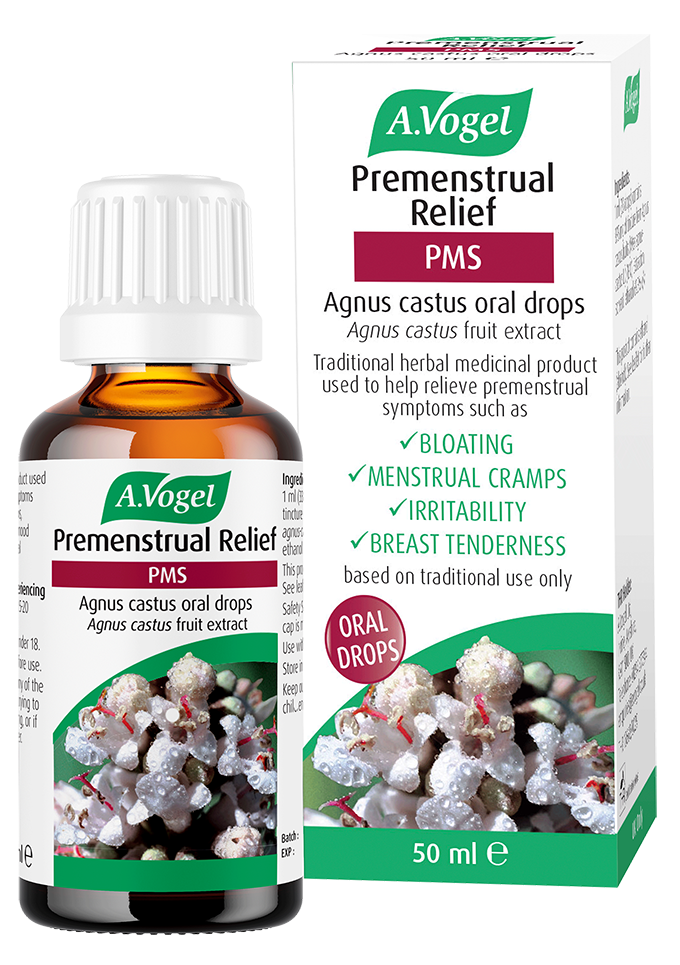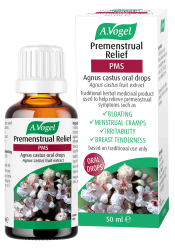An introduction to periods and bloating
Bloating in the lead up to menstruation is a common complaint. Fluctuating hormones can give rise to water retention, digestive issues and cravings, all of which can make your jeans feel that little bit tighter!
Keeping track of when you feel bloated throughout the month is a useful first step. If you become bloated around the same time each month, it suggests that hormones are indeed likely to be to blame! If you suffer from bloating which is severe or which doesn’t appear to be in sync with your monthly cycle, it may be worth paying your doctor a visit.
Bloating around the time of your period often happens as a result of a number of factors; on this page I begin by discussing some of these. I then go on to describe how dietary and lifestyle changes, herbal remedies and finally, conventional medicines can help.
How can your period cause bloating?
Hormones are the root cause of many symptoms that appear around the time of your period. We know that there is a significant fall in both oestrogen and progesterone ahead of menstruation and it is around this time many symptoms become apparent!
The magnitude of the effect these hormones can have all over the body and on other hormones is quite significant. Here I describe three effects which can give rise to bloating:
- Water retention – Water retention is often the reason you feel so bloated in the days before your period. Many women temporarily put on weight, but this is usually just water weight and generally this bloating and water retention normalises once menstruation begins. Oestrogen is thought to be the main hormone responsible for water retention, and if bloating is a regular occurrence, this hormone could be behind it – many women are thought to be oestrogen dominant
- Constipation – Menstruation, or your sex hormones more specifically, can also have an impact on your digestion – the balance of these hormones is crucial. If this is disturbed (depending on the direction of the imbalance) you can become constipated or have diarrhoea. Many women find they are going to the loo less often in the lead up to their period which can result in bloating. However, once your period starts, your womb contracts and this can actually kick-start a sluggish bowel! Although oestrogen dominance can often give rise to water retention, progesterone can have it's part to play too, a sluggish bowel can be the result of this hormone instead, especially if this conincides with a longer cycle!
- Cravings – Falling levels of oestrogen and progesterone in the lead up to your period can have an impact on other hormones too. Levels of serotonin, for example, (responsible for controlling your mood) can fall, and levels of cortisol (a stress hormone) often increase. This is a troublesome combination which can leave you feeling down in the dumps and craving comfort foods! Many women crave carbohydrate-rich foods in a bid to up their serotonin levels and you might find yourself leaning for a quick fix of something processed such as crisps or bread a little too often! Carbohydrates will temporarily boost your serotonin but you really need good quality protein for a sustained release. Also, take into account the salt content and hidden calories in many of these carbohydrate heavy foods which can cause water retention in the short-term and weight to creep on longer-term.
Dietary and lifestyle factors
So, what simple steps can you take to limit the pre-menstrual bloat? I describe some of my top tips:
- Water – Drinking plenty of water is crucial on any day of the month, but especially around the time of your period. Plenty of water will help to keep your bowels moving – and regular bowels allow for a flatter tum. Also, drinking plenty of water means you are less likely to suffer from water retention
- Keep salt at bay – Keep salt to a minimum is important. Salty foods flood your system with excess sodium, which causes your cells to swell. Watch out for the salt content in processed foods, not to mention the refined sugar content too as this won’t help your waistline either
- Include magnesium and potassium rich foods – Magnesium and potassium keep your cells hydrated but protect against water retention, unlike excess sodium. Eat plenty of fresh foods including fruit, vegetables, nuts, seeds and wholegrains
- Exercise – Exercise can help to keep your bowels moving and helps to release feel-good endorphins which can give your serotonin levels a boost – this can help you resist cravings. Remember to drink plenty of water after exercise to avoid dehydration.
Herbal remedies to help
If bloating is a common occurrence each month, you may want to couple a herbal remedy with your dietary and lifestyle interventions.
- Agnus castus – Agnus castus is licensed herbal remedy which can be used to help relieve the symptoms of PMS. Agnus castus gently helps support your natural levels of progesterone. Often excess oestrogen relative to progesterone is to be blame for symptoms such as bloating and water retention, mood swings, sore breasts and heavy, painful periods
Premenstrual Relief Agnus castus Oral Drops| Helps Relieve Pre-Menstrual Symptoms | Mood Swings, Menstrual Cramps, Bloating & Breast Tenderness
£12.99 (50ml) In Stock Get it tomorrow, 3rd July.
- Soy isoflavones - If low oestrogen is a more likely story, progesterone could be having it's way giving rise to irregular, infrequent periods and a rounder tum, constipation and flatulence. Try soy isoflavones to gently support your oestrogen levels.
Please note, if you are taking hormonal contraceptives such as the pill, hormone-balancing herbal remedies may not be suitable for you.
Can my doctor help?
In extreme cases of bloating it would be advisable to visit your doctor. They can investigate the cause as there may be some underlying issue – generally your period shouldn’t cause extreme bloating.
If hormones are the cause of your issues a hormonal contraceptive may be an option. These contain synthetic forms of oestrogen and progesterone which can be used to help balance your hormones, although; always beware of any side effects these may bring.






 Looking for our products in a store near you?
Looking for our products in a store near you?

